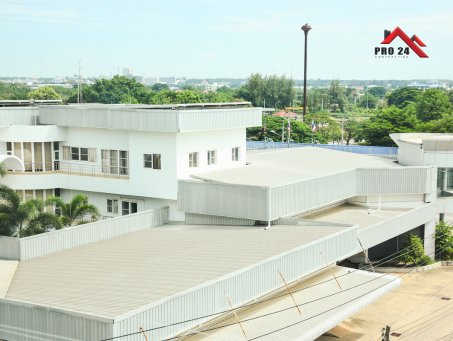Flat roofs are a top choice for commercial buildings, prized for their affordability, long-lasting performance, and adaptability. However, the type of material you choose for your flat roof can significantly impact its performance, longevity, and maintenance needs. With numerous options available, understanding the pros and cons of each material is crucial to making the right decision for your building. In this guide, we’ll explore the top five flat roof materials for commercial buildings, including TPO, EPDM, PVC, modified bitumen, and built-up roofing, helping you determine the best fit for your needs.
Why Choosing the Right Flat Roof Material Matters
Flat roofs differ from sloped roofs in that they have a much lower pitch, making drainage and durability key considerations. The material you select can affect:
- Longevity: Some materials offer decades of durability, while others require more frequent maintenance.
- Energy Efficiency: Certain materials provide superior insulation or reflectivity, reducing energy costs.
- Cost: Initial installation costs and long-term maintenance expenses vary widely among materials.
- Environmental Impact: Modern flat roof materials often incorporate sustainable features, such as recyclability or energy-efficient coatings.
By selecting the right material, you can maximize your roof’s lifespan and minimize costs over time.
1. Thermoplastic Polyolefin (TPO)
TPO is one of the most widely used flat roof materials for commercial buildings. Known for its affordability and energy efficiency, it’s a go-to choice for businesses seeking cost-effective roofing solutions.
Pros
- Optimized Energy Use. TPO membranes offer exceptional reflectivity, minimizing heat absorption and significantly cutting cooling costs.
- Durability. TPO roofs excel in harsh environments, offering resistance to UV rays, punctures, and chemical exposure.
- Lightweight. The material is easy to install and doesn’t add significant weight to the building structure.
- Environmentally Friendly. Many TPO products are recyclable, making them an eco-conscious option.
Cons
- Shorter Lifespan. While durable, TPO roofs typically last 15–20 years, shorter than some other materials.
- Installation Sensitivity. Proper installation is critical. Poor welding of seams can lead to leaks.
Cost
- Installation costs range from $5 to $8 per square foot, depending on the roof size and location.
TPO is ideal for businesses in hot climates looking to save on energy costs without breaking the bank.
2. Ethylene Propylene Diene Monomer (EPDM)
EPDM, commonly referred to as rubber roofing, is a popular flat roof material due to its simplicity and longevity. Its black membrane is well-suited for various climates and building types.
Pros
- Durability. With proper maintenance, EPDM can last up to 30 years, making it one of the most durable and long-lasting flat roofing solutions available.
- Weather Resistance. The material performs well in extreme temperatures, resisting cracking and damage.
- Ease of Repair. EPDM membranes can be easily patched if damaged, reducing maintenance costs.
- Affordability. EPDM is one of the most cost-effective flat roof materials.
Cons
- Energy Efficiency. The standard black membrane absorbs heat, which can increase cooling costs in warmer climates. White EPDM membranes are available but may cost more.
- Aesthetics/ The plain, black appearance may not be as visually appealing as other materials.
Cost
- Installation costs average between $4 and $7 per square foot, making it a budget-friendly option.
EPDM is perfect for businesses in colder climates or those looking for a long-term, low-maintenance solution.
3. Polyvinyl Chloride (PVC)
PVC roofing is a premium flat roof material known for its superior performance, especially in areas with exposure to chemicals or heavy foot traffic.
Pros
- Durability. PVC membranes are highly resistant to chemicals, punctures, and fire, making them ideal for industrial applications.
- Energy Efficiency. Like TPO, PVC roofs are highly reflective, reducing energy costs in hot climates.
- Flexibility. The material is pliable, making it easier to install around vents, pipes, and other roof features.
- Low Maintenance. PVC roofs require minimal upkeep, reducing long-term costs.
Cons
- Higher Initial Cost. PVC is more expensive than TPO or EPDM.
- Environmental Concerns. PVC production involves chlorine, which is less eco-friendly than other materials.
Cost
- Installation costs typically range from $6 to $12 per square foot, depending on the roof’s complexity.
PVC roofing is an excellent choice for businesses needing a durable, low-maintenance roof that can withstand harsh conditions.
4. Modified Bitumen
Modified bitumen is an asphalt-based material that has been reinforced with polymers for improved flexibility and durability. It is applied in multiple layers, making it one of the more traditional flat roof materials.
Pros
- Durability. With proper installation, modified bitumen can last up to 20 years.
- Flexibility. The material expands and contracts with temperature changes, reducing the risk of cracking.
- Multiple Installation Options. It can be applied using hot-mop, torch-down, or self-adhering methods.
- Impact Resistance. Modified bitumen is highly resistant to damage from hail and heavy foot traffic.
Cons
- Labor-Intensive Installation. Multiple layers and specific application methods can increase labor costs.
- Energy Efficiency. Traditional modified bitumen lacks reflectivity, although reflective coatings can be added for an additional cost.
Cost
- Installation costs range from $3 to $6 per square foot, making it one of the more affordable options.
Modified bitumen is a great choice for businesses looking for a cost-effective and durable flat roof material.
5. Built-Up Roofing (BUR)
BUR is one of the oldest flat roof systems, consisting of multiple layers of bitumen and reinforcing fabrics. It is finished with a top layer of gravel or mineral coating.
Pros
- Proven Performance. BUR has been used for over a century, demonstrating its reliability and durability.
- Weather Resistance. The multiple layers provide excellent protection against water and UV rays.
- Fire Resistance. The top layer of gravel adds a layer of fire protection.
- Cost-Effectiveness. BUR systems offer a balance between upfront costs and long-term durability.
Cons
- Weight. BUR systems are heavier than single-ply options, requiring additional structural support in some cases.
- Labor-Intensive. Installation is time-consuming, which can increase labor costs.
- Aesthetics: The gravel top layer may not be visually appealing for all commercial buildings.
Cost
- Installation costs average between $5 and $9 per square foot, depending on the number of layers and roof size.
BUR is an excellent option for buildings that need a reliable, time-tested flat roof system.
Choosing the Best Flat Roof Material for Your Building
When selecting a flat roof material, consider the following factors:
- Budget. Determine both your upfront budget and long-term maintenance costs.
- Climate. Reflective materials like TPO and PVC are better for hot climates, while EPDM works well in colder regions.
- Durability Needs. If your roof experiences heavy foot traffic or chemical exposure, opt for PVC or BUR.
- Environmental Impact. TPO and PVC offer energy efficiency, while EPDM and modified bitumen are more sustainable in production.
- Aesthetic Preferences. If the roof’s appearance matters, discuss options with your contractor to find the best match.
Why Choose Pro 24 Contracting for Your Flat Roofing Needs?
At Pro 24 Contracting, we understand that your commercial roof is a critical investment that protects your property, operations, and employees. Choosing the right roofing contractor is just as important as selecting the right material. Here’s why Pro 24 stands out as the best choice for your flat roofing needs:
Decades of Expertise in Flat Roofing
With years of experience in commercial roofing, our team has handled projects of all sizes and complexities. From small retail shops to large industrial facilities, we’ve seen it all. This expertise ensures we can recommend and install the perfect roofing system for your specific needs, giving you peace of mind that your investment is in capable hands.
Comprehensive Material Knowledge
Flat roof materials like TPO, EPDM, PVC, modified bitumen, and BUR each have unique properties and benefits. Our team is highly trained and knowledgeable about these materials, ensuring we can guide you to the best choice for your building, budget, and environmental conditions.
- Need energy efficiency? We’ll recommend TPO or PVC.
- Looking for long-term durability? EPDM or BUR might be the way to go.
- Prioritizing cost-effectiveness? Modified bitumen could be your answer.
We’re not tied to one solution; instead, we focus on what works best for your building.
Customized Roofing Solutions
At Pro 24, we know that every commercial building is unique. That’s why we take the time to assess your property’s structural needs, usage patterns, and environmental factors before recommending a roofing system. Whether you need a high-performance solution for heavy foot traffic or a budget-friendly option for a warehouse, we create tailored plans that align with your goals.
Flawless Installation
Even the best flat roof material can fail if not installed correctly. At Pro 24, we pride ourselves on meticulous craftsmanship. Our certified installers follow industry best practices and manufacturer guidelines to ensure a flawless installation that maximizes the lifespan of your roof. From ensuring tight seams in TPO and PVC to layering modified bitumen correctly, we don’t cut corners.
Protect Your Investment with the Right Flat Roof Material
Choosing the right flat roof material is a critical decision for any commercial building owner. Each option—TPO, EPDM, PVC, modified bitumen, and BUR—has its unique benefits and drawbacks, making it essential to assess your specific needs before committing. Factors like climate, budget, energy efficiency, and durability should all influence your choice.
At Pro 24, we’re here to simplify the process. Our team of roofing experts will guide you in selecting the best material for your building, ensuring long-lasting protection and performance. Whether you need a budget-friendly solution like EPDM, a high-performance option like PVC, or a traditional system like BUR, we’ve got you covered.
Don’t leave your roofing decisions to chance. Contact Pro 24 today for a consultation and let us help you protect your commercial property with a roof that stands the test of time. With Pro 24, you can trust that your investment is in capable hands.

